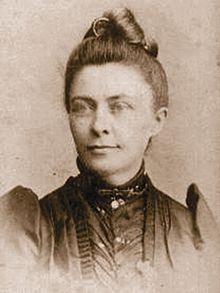Martha Watts | |
|---|---|
 | |
| Born | Martha Hite Watts February 13, 1848 Bardstown, Kentucky, U.S. |
| Died | December 30, 1909 (aged 61) Louisville, Kentucky, U.S. |
| Resting place | Cave Hill Cemetery Louisville, Kentucky, U.S. |
| Nationality | American |
| Other names | Martha H. Watts, Mattie H. Watts |
| Occupation(s) | educator, missionary |
| Years active | 1881–1909 |
Martha Watts (February 13, 1848 – December 30, 1909) was an American missionary and school teacher who established four educational facilities in Brazil. Educated in Kentucky at the Louisville Normal School, she was in the first graduating class in the early 1870s and became a teacher, working in the public schools. After joining the Broadway Methodist Church in 1874, Watts joined a youth missionary society and founded a Sunday school class. In 1881, after applying to the Women's Board of Foreign Missions, she was accepted as the second woman from the United States to act as a foreign missionary and was the first woman to be sent to Brazil.
Arriving in the state of São Paulo in 1881, Watts' mission was to establish a school in Piracicaba. Within months, though she only had one student, Watts had opened the Colégio Piracicabano and began by recruiting a French teacher, Marie Rennotte, in 1882. At the time, most educational materials had been translated into French, as it was the universal language of education. The two women worked together to design an innovative co-educational learning environment, which offered courses in languages, literature, mathematics, philosophy, and the natural and physical sciences. Though criticized by conservative sectors of society and the Catholic Church, Watts gained powerful supporters, including prominent progressive politicians, lawyers, masons, and abolitionists. By the 1890s, the school method and curricula had gained wide support, the student body had grown substantially, and their methods were being implemented throughout the state.
Watts remained at the Colégio Piracicabano for 14 years and then established three other schools in the states of Minas Gerais and Rio de Janeiro. Failing health led to her retirement in 1909 and a return to Louisville, Kentucky, where she died at the end of that year. She is remembered in Brazil as the pioneer in bringing Methodist education to the country. An annex of the Colégio Piracicabano is named in her honor, as is the cultural center of Piracicaba, one of several facilities which bear her name or pay homage to her role in the development of a modern educational system.
© MMXXIII Rich X Search. We shall prevail. All rights reserved. Rich X Search
